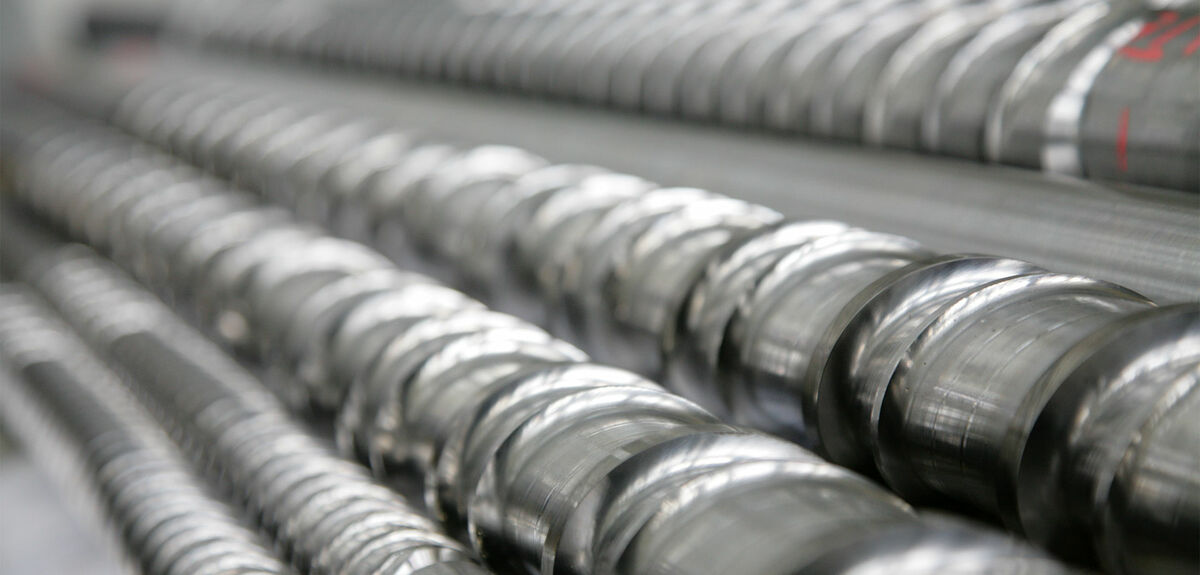by Ludwig Engel

Robust enough for recyclate: Engel opts for wear-resistant components from Reifenhäuser Reiloy
Whether the issue is climate change, waste problems or increasing regulatory requirements, manufacturers of injection-molded plastic products are increasingly required to process recyclates. This is no easy task, says Dr. Klaus Fellner, Team Leader for Circular Economy at Engel Austria GmbH: "Whenever we talk to our customers, they tell us lawmakers are demanding something from them that they are unable to fulfill technically. So, the pressure on industry is enormous. What is needed are technical solutions to get more recyclate into products."
Engel is a global market leader for injection-molding machines and supports customers in their search for the right solution, for example, to process recyclate into non-food packaging, ranging from sealing caps to large trash cans, shipping boxes, and pallets.
Variations in input material
There are many challenges when it comes to processing recyclate in injection molding. "It starts with the quality of the recyclate," says Fellner. "Recyclate is never 100% pure." It contains contaminants from the residue of the original packaged products, such as oil or grease, and foreign objects, such as metal staples. Contaminants or moisture can even come from shipping and storage. "The raw material contains a chemical cocktail that affects processability," Fellner explains.
On top of that, recyclates are often not sorted by type. For example, there are thin-flow and thick-flow polypropylenes - but they come mixed in the recycling raw material. "There again, the flow properties are not constant throughout the day," Fellner explains. "This must be taken into account in injection molding to obtain consistent product quality."
Machine configuration dependent on recyclate quality
Processing recyclate therefore usually requires customized adaptations to the machine. "We see ourselves as a reliable and solution-oriented partner for our customers - from product development and processing through to the efficient use of recyclates," says Fellner. For example, the recycling specialists at Engel have developed a machine setup that allows plastic waste to be injection-molded from flakes directly after grinding. However, the injection-molding machines then require larger feed openings. Other cases may need dosing units for additives or degassing and filtration systems to remove residue from the raw material and achieve higher product quality.
Call for greater wear protection
"There must also be adequate wear protection since it is impossible to exclude impurities from the recyclate or the flakes," says Fellner. This stress test is especially tough on the plasticizing unit which melts the recyclate since mineral components, metal and wood residue, and some additives have an abrasive effect. What is more, chemical components such as washing lyes and residue from printing inks accelerate corrosion. Water vapor, on the other hand, causes cavitation, and this requires a base material that has high strength. "The various problems compound each other," explains Fellner. "Corrosion produces tiny holes in the surface that then becomes more porous and wears faster."

Dr. Klaus Fellner
Klaus Fellner studied Polymer Engineering and Science at University of Leoben, Austria. During his PhD study he focused on Computational Mechanics and Materials Testing. In 2016 he started at ENGEL Austria GmbH, where he worked as Assistant to the CEO and later as R&D engineer for plasticizing systems and recycling. Since 2022 he is Team Leader for Circular Economy at Engel Austria GmbH.
Once the surfaces in the plasticizing unit are damaged, production suffers as a result: "The parameters change, the process is no longer stable, system performance drops, and throughput decreases," lists Fellner. In addition, deposits adhere to surfaces more quickly, and they then precipitate into the product. To counter the signs of wear, Engel Austria GmbH relies on highly wear-resistant components from Reifenhäuser Reiloy, its main supplier for screws and barrels. "Reifenhäuser Reiloy has a very good portfolio for wear protection," Fellner finds. "You can select the right wear protection for almost any phenomenon."

Claudia Rosenbach advises customers on wear protection at Reiloy and emphasizes: “We have decades of know-how in wear protection and our portfolio includes a variety of iron-based alloys and nickel-based alloys that cover a whole range of raw materials.” Reiloy is also the only screw and barrel manufacturer that develops and produces its own hardfacing alloys at its in-house materials laboratory - as well as the powders required for wear protection. "The deciding factor for optimized wear protection is the alloy composition," explains Rosenbach. "On the other hand, the interaction between the barrel and screw hardfacing and the selected surface treatment also plays a major role."
Wear-protection knowledge
What are the key parameters that actually affect wear resistance? Click here to read an interview with Anna Rottstegge, Head of Research & Development at Reifenhäuser Reiloy.
Engel has been satisfied with Reiloy quality for many years: "The materials match very well and protection against abrasion and corrosion is also extremely balanced," says Fellner in summary: "Reifenhäuser Reiloy has set standards on the market - in the performance of wear protection and also in the depth of its portfolio."
Wear protection pays off
Before the engineering experts at Engel configure a machine, they first analyze the raw material the customer wants to process and then recommend a suitable design for the plasticizing unit. In particularly tricky cases, they turn to Reifenhäuser for advice. This is an effort that is well worthwhile for customers, as Fellner emphasizes: "An investment in wear protection always pays off." This is because high-quality components extend the service life of the unit and ensure high, long-term product quality.
It is difficult to estimate how much longer the screw and barrel will remain operational, as this depends on the raw material processed. But in general, you can safely say that without wear protection, the speed of deterioration is very fast. "In some cases, we’re talking about weeks," clarifies Fellner. The consequence: First, scrap rates rise, then at some point, the line comes to a standstill and components have to be replaced. However, such extreme cases are the exception, says the head of plasticizing systems at Engel: "Most of our customers are convinced that a long service life makes the most sense, both economically and ecologically."